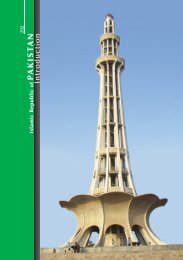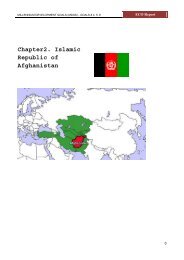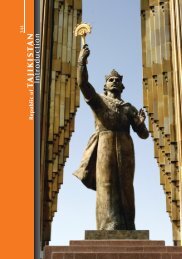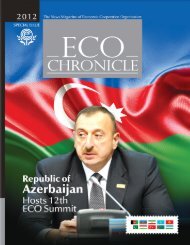ECO-IEST President, Alternative Member to the IPBES Bureau
ECO-IEST President, Alternative Member to the IPBES Bureau
ECO-IEST President, Alternative Member to the IPBES Bureau
Create successful ePaper yourself
Turn your PDF publications into a flip-book with our unique Google optimized e-Paper software.
News<br />
Solar Energy<br />
in Uzbekistan<br />
<strong>ECO</strong><br />
CHRONICLE<br />
An era of uncertainties related <strong>to</strong><br />
petroleum industry and oil prices has<br />
left inves<strong>to</strong>rs and nations scrambling <strong>to</strong> develop alternative<br />
sources of energy. The <strong>the</strong>oretical annual potential<br />
of solar power is estimated <strong>to</strong> exceed all fossil fuels<br />
reserves by more than 10-20 times.<br />
In <strong>the</strong> <strong>ECO</strong> region, solar power is receiving renewed<br />
attention, particularly in <strong>the</strong> Republic of Uzbekistan,<br />
with a population of 26 million.<br />
Besides a climate suited <strong>to</strong> solar power, Uzbekistan<br />
brings advantages <strong>to</strong> <strong>the</strong> table, including a longstanding<br />
interest in generating power from sunlight, an<br />
advanced industrial base and a highly literate, hardworking<br />
population.<br />
The technical potential of solar energy in Uzbekistan<br />
is immense and is estimated <strong>to</strong> exceed by 400 percent<br />
<strong>the</strong> country's annual energy needs of 65 million <strong>to</strong>ns of<br />
oil equivalent. The problem for Uzbekistan, as with<br />
many alternative energy sources, is <strong>the</strong> relatively high<br />
start-up costs.<br />
Initial projects have been modest in scope, with a<br />
major effort being made <strong>to</strong> develop solar-powered<br />
hot-water supply systems for use in such enterprises as<br />
agricultural greenhouses, cattle farms and <strong>the</strong> drying<br />
and canning of fruits and vegetables.<br />
Officials in Tashkent have been busy<br />
searching out funding for solar projects<br />
from a variety of sources, including <strong>the</strong><br />
United Nations. Under a grant from <strong>the</strong><br />
U.N. Development Program, scientists of<br />
<strong>the</strong> Uzbek Physical and Technical Institute<br />
and Agency for Technology Transfer have<br />
instituted <strong>the</strong> "Pure Energy for Rural<br />
Communities in Karakalpakstan" project,<br />
which allowed specialists at Uzbekistan's<br />
"Fo<strong>to</strong>n" Plant <strong>to</strong> produce 25 pho<strong>to</strong>electrical<br />
systems for supplying <strong>the</strong> people of <strong>the</strong><br />
Aral Sea region with electricity and hot<br />
water in <strong>the</strong> designated Ayazkala <strong>to</strong>urist<br />
complex, which uses solar pho<strong>to</strong>voltaic<br />
batteries <strong>to</strong> supply <strong>the</strong> facility with energy<br />
and desalinated drinking water.<br />
Uzbekistan is on <strong>the</strong> crest of a development<br />
wave in alternative energy sources,<br />
as environmental concerns and o<strong>the</strong>r fac<strong>to</strong>rs<br />
are driving many nations <strong>to</strong> consider<br />
solar power.<br />
The 12th <strong>ECO</strong> Summit (Baku 16 Oc<strong>to</strong>ber<br />
2012) acknowledged <strong>the</strong> vast potential of<br />
<strong>the</strong> <strong>ECO</strong> region in <strong>the</strong> field of renewable<br />
sources of energy and its importance for<br />
sustainable development.<br />
According <strong>to</strong> Uzbekistan government<br />
officials <strong>the</strong> concerned authorities are<br />
pressing forward with bringing <strong>to</strong>ge<strong>the</strong>r<br />
solar specialists from around <strong>the</strong> world <strong>to</strong><br />
share ideas on research on solar power.<br />
It is estimated that <strong>the</strong> country's proven<br />
reserves of black coal may last for an estimated<br />
50 years at <strong>the</strong> most; oil for not<br />
more than 12; and natural gas for about<br />
30 years. Beyond any doubt, Uzbekistan<br />
has immense potential for using alternative<br />
energy sources, such as wind and solar<br />
power. With sunny days 82% of <strong>the</strong> time,<br />
and high-wind terrains and fast-moving<br />
mountain rivers, Uzbekistan has <strong>the</strong><br />
potential <strong>to</strong> produce three times as much<br />
energy as hydrocarbon reserves would<br />
allow.<br />
<strong>ECO</strong> CHRONICLE<br />
13















